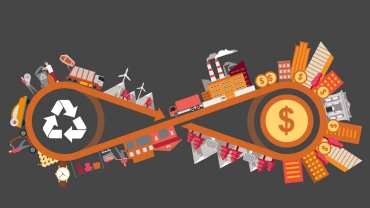
The world has ten years to halve global greenhouse gas emissions. The path towards ‘net zero’ adopted by a number of companies is proving a major help in stopping a global rise in temperatures of more than 1.5°C. What part do retail banks have to play and how effectively are Swiss banks positioned to impactfully support the transition to a more sustainable economy and society?
The financial sector as a significant key player in the transition to a sustainable economy
The financial sector has a key role to play in the transition to a sustainable economy, since it has an influence on the current and future nature of our economy in the way it allocates capital and manages risks. For this reason, financial flows should follow clearly defined and measurable transition paths in order to meet the target of reducing net greenhouse gas emissions to zero by no later than 2050 and restoring biodiversity.
Retail banks with local roots, in particular, can exploit their close ties with the domestic economy and population by aligning their financial flows with sustainable development targets to effect change in the real economy. The transition towards people and business working in harmony with the environment is creating new opportunities in Switzerland, while at the same time fulfilling international obligations such as the Paris Climate Agreement.
WWF and PwC have investigated the sustainability of the 15 biggest Swiss retail banks
Against this backdrop, WWF Switzerland and PwC explored what progress Swiss retail banks have made in supporting the Swiss economy and population on its sustainable development path since the publication of the WWF rating of the Swiss retail banking sector 2016/2017. The results show where the individual financial institutions stand in this respect today and where they can still improve. The report also identifies where there might still be some potential to expand offerings of sustainable products and services and improve general sustainability management.
No trend-setters or visionaries, but a significant number of ambitious banks and a broad average group
None of the banks were classified as ‘Visionaries’ or ‘Pioneers’, but seven banks were classified in the category of ‘Ambitious’ institutions. Six banks were allocated to the ‘Average’ category while two banks were defined as ‘Latecomers’.
Some progress has been made among the analysed retail banks since the last rating four years ago. For instance, the concept of sustainability is now a key strategic focus for almost all the assessed retail banks and is integrated into their overall organisational structures. Many are actively engaged in sustainability initiatives, and a broad range of sustainable products and services are offered in the area of savings, investments and pension provision. However, there are still issues with regard to transparency and comparability due to there being no binding classification system for the standardisation of sustainable financial products.
The area of loans and financing is still where the greatest potential lies for expanding the range of sustainable products and services offered and directing financial flows towards sustainable business activities. While almost all banks offer eco mortgages, there are only isolated examples of product innovations in the area of loans and financing otherwise.
The results show that there is great potential for banks to further set themselves apart and play an effective role in fulfilling international obligations such as the Paris Climate Agreement and transitioning towards a sustainable economy.
Retail banking rating 2020/2021 by WWF Switzerland and PwC Switzerland
The current retail banking rating by WWF and PwC objectively highlights sustainability in Switzerland’s 15 biggest retail banks and assesses where banks are on the path to becoming a visionary retail bank.
While banks have made some progress since the last rating four years ago, a great deal of potential remains for innovative solutions and having a real impact in achieving international obligations such as the Paris Climate Agreement and the transition to sustainable business models.
Further information and the results can be found in the full report.









